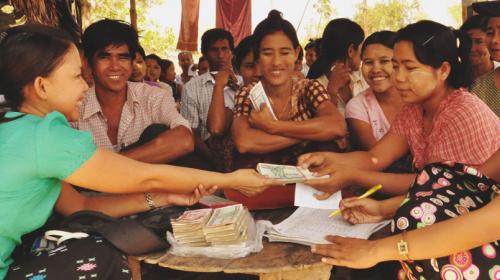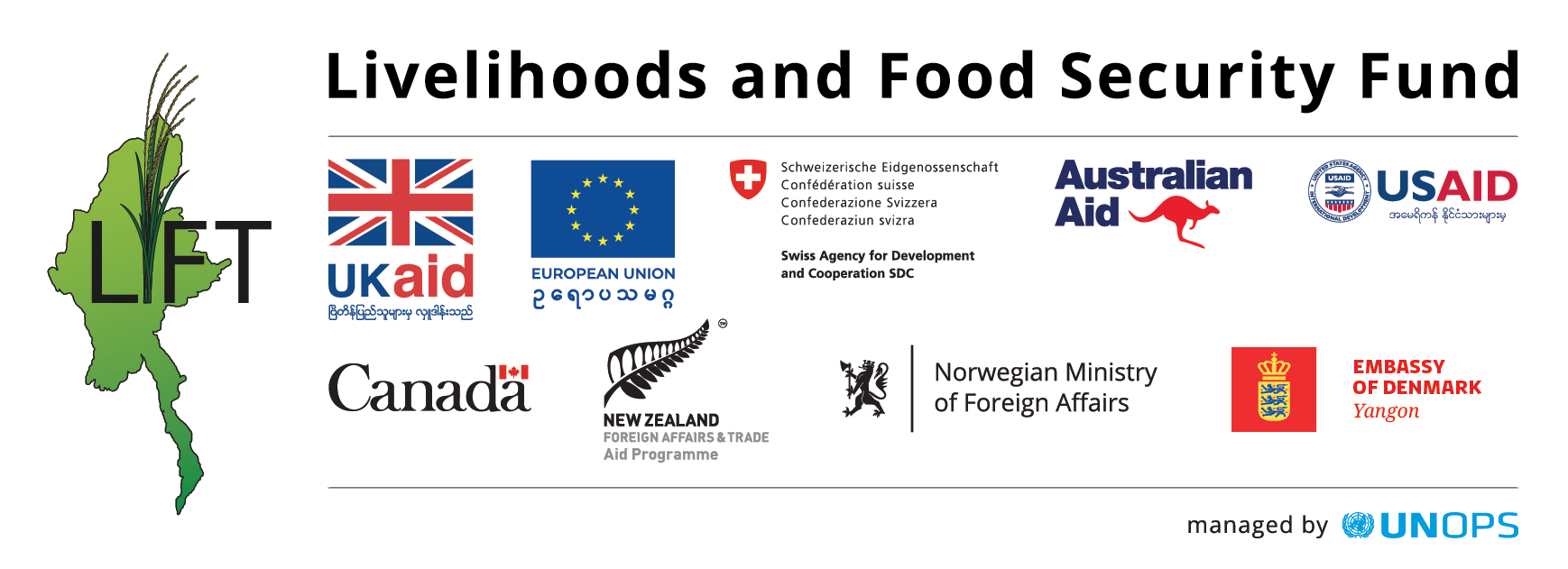
In a prayer hall on the outskirts of a tidy village in the Ayeyarwady Delta, Daw Win Win Maw gets to her feet in front of a group of women and is handed a large wad of money. “This is five lakh ($500),” says the woman who hands it over. “Now tell us how you will use it.´
Daw Win Win flashes a grin at her friends and rattles off a list of repairs and purchases. This is not her first loan and she knows the procedure. She promises to pay back the money within the year at an interest rate of 2.5% per month, knowing that saying her intentions out loud binds her to the four others in her savings group – who are here as witnesses - in a code of honour. She signs the contract, thanks everyone present and then she’s off – back to business.
Over a palm tree bridge, down a maze of dusty, tree lined paths, you can hear her business long before you see it. She has a diesel generator that runs all day, three days a week, hooked up to recharge a grid of battery packs. Today there are 50 packs – during the rainy season there are more, when solar power is not so reliable. These belong to individuals in her village who use them for domestic purposes - to power lights, television, fans - and each owner will pay Daw Win Win 400 kyats for a recharge. She also owns 11 packs that she rents out. Since 84% of rural households in Myanmar are without electrical connection (World Bank 2015), her type of business is in demand.
She and her husband identified a way to handle the power gap in the village ten years ago and researched the right technology. But the loan she took out for her first generator was from a local money lender and she became caught up in a cycle of high-interest debt, thinking her business may even fail. Then Pact Global Micro Finance (PGMF) arrived in the village, offering loans at a quarter of the interest charged by moneylenders, and suddenly she found herself in the position to pay off her expensive loan and feed her household of 11 people – some of whom chip in to pay household expenses from the wages they earn as casual labourers.
Daw Win Win was able to take another loan to expand the business, and then another. After a series of gains, this year she was able to pay $1600 to buy a lightweight thresher and a boat to transport it with. The income from renting this out at harvest time provides her with a second reliable source of revenue.
Across the road from her battery charging shop is her well-ordered family home. There are children blowing raspberries at each other in the front yard and Daw Win Win scoops up one of them as we go inside. “My grandson weighted only two pounds when he was born,” she says. “His mother had a stroke and couldn’t feed him. We had to pay $1200 to get him into good health at the clinic in Bogale, and for milk formula.” The little boy picks at the flowers in her hair. “But thanks to my business, we had the money.”
Family is this 49- year- old’s priority. “The happiest day of my life was when my youngest daughter graduated from school,” she says. “So all of my four children were educated, healthy and could go out into the world.” She and her youngest daughter are now eyeing up another business opportunity. With vocational training, her daughter will have the skills to set up the villages' first ever tailor shop. They simply need to finance this plan.
PGMF has a one- loan- per- household rule. “Your daughter may have to move out,” I suggest. “No!” says the motherly Daw Win Win, with a big smile. “With our two businesses now operating, we’ll be able to find a way.”
LIFT is pleased to fund PGMF, who provide loans to poor rural people that have limited livelihoods choices, to help them become income secure. This ties in with the Stepping Out of the LIFT strategy, where people who are involved in subsistence farming or casual labour are supported to ‘step out’ into jobs which are better paid and/or offer support services to farming.
By the end of 2015, LIFT had provided over a quarter of a million households with access to affordable credit, mainly through partners PGMF and Proximity Finance. Around 75 per cent of borrowers are women. Furthermore, LIFT partners now provide financial services to nearly 80 per cent of all microfinance clients in Myanmar. To learn more about LIFT’s Financial Inclusion strategy, please visit this page.





